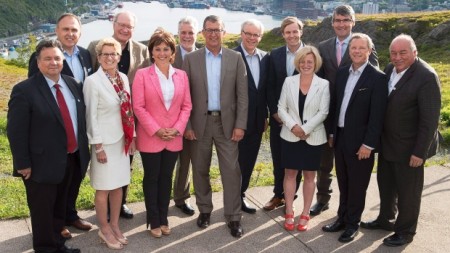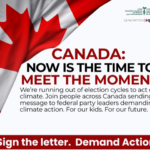July 18, 2015 – In an indictment of a political process hijacked by self-serving fossil fuel energy producing provinces, Canada through its provincial and territorial leaders has shown a lack of conviction in addressing climate change adaptation and mitigation investment. Coming out of the previous week’s PanAmerican Games-inspired Climate Summit of the Americas gathering with Ontario’s Premier as host, and where the focus was on strategies to transform the world to a low-carbon future, this all Canadian meeting described itself as “the culmination of many months of research and collaboration among provincial and territorial governments and stakeholders.” And out of all that effort this Canadian Energy Strategy pays lip service to climate change objectives while talking a lot about responsible energy production and distribution. Described as a collaboration of provinces and territories without any federal government input, the shared vision is hardly visionary concentrating on energy development and conservation initiatives rather than laying out a transition to a lower-carbon future to deal with atmospheric warming and its consequences.
What the premiers agreed to do includes:
- programs to improve energy efficiency and conservation for consumers, business and government by targeting sectors such as transportation, new construction, existing homes and legacy buildings, and appliances.
- development of complementary carbon management approaches in all provincial and territorial jurisdictions looking at market mechanisms to reduce greenhouse gas emissions while giving each jurisdiction flexibility in determining target levels and implementation with a mind to ensuring economic competitiveness is not impacted.
- collaboration across all energy sectors to develop a comprehensive collection of data for presentation and educational awareness to all current and future information users.
- investment in research and development of technologies to support safe and sustainable energy production, distribution and consumption remaining mindful of Canada’s reputation as a “responsible energy producer.”
- improvement in employment opportunities within the energy sector in all jurisdictions through a joint strategy involving investments in education and training, addressing skills deficits and lowering barriers to labour mobility across sub-jurisdiction boundaries.
- “develop an action plan” in support of greater deployment of clean and renewable energy including delivery to off-grid and remote communities.
- identification of requirements for transportation and transmission of energy products to meet domestic requirements and for export to international markets.
- review all regulatory policies to ensure energy projects can navigate through processes efficiently including “a review of aboriginal engagement methods” (the last seemingly line of defense against approving pipelines these days) used by all sub-jurisdictions.
- attract domestic and international investment to the energy sector for both production and transmission through “an integrated energy marketing strategy.”
- establish an international voice for Canadian sub-jurisdictions addressing “negotiations involving both energy and climate change.”
The end result, the creation of four committees under the leadership of provincial ministries focused on energy with a goal to report to the premiers in 2016 on progress around the following four themes:
- Energy Efficiency
- Energy Delivery
- Climate Change and a Transition to a Lower Carbon Economy
- Technology and Innovation
This is the best the meeting of Canada’s sub-jurisdiction political minds could come up with regarding the dual challenge of energy production in the midst of a world facing increasing climate change – a meeting to create committees to conduct further meetings. More talk, and a kicking of the can, called climate change, down the road.
One premier of note, Saskatchewan’s Brad Wall, came to the meeting in a fighting mood. Currently with his province besieged by drought and countless wildfires (climate change in action) and with thousands evacuated from their homes, Wall proudly proclaimed that “oil is not a four-letter word.” For Wall, whose province has oil to harvest, the meeting was about getting pipelines built to move his province’s resource to export markets. Whether the pipelines go north-to-south, east-to-west, or west-to-east, Wall doesn’t want any other province getting in his way by holding up projects. Kathleen Wynne, premier of the province of Ontario, conceivably one of the people who could get in his way, stated she recognized the value of the energy sector but acknowledged “we’re running out of time” on the climate change file.
Calling building pipelines a “no brainer” is a phrase most associated with Canada’s Prime Minister, Steven Harper. Words, no doubt, that Wall would happily repeat and words that the oil and gas industry proclaim frequently. But continuing to mine and pump fossil fuels without a significant investment in both mitigation and adaptation to deal with the consequences of rising carbon dioxide and methane greenhouse gases didn’t seem to be at the forefront of the premiers’ minds if you read the Canadian Energy Strategy.
Where New York City, Boston and the federal government in the United States have drafted plans for the climate change future and are beginning to make the necessary investments in infrastructure, in moving away from carbon-based fuels, in developing distributed power generation through micro-grids, and in encouraging residential solar, all we got this week in Canada is more talk and a limp document.
Not to say we haven’t made progress. We have British Columbia’s carbon tax. We have Quebec, California and soon, Ontario, part of a North American cap-and-trade system. But what we don’t have is a real climate action plan within a comprehensive energy strategy that plans for the low-carbon transition. We don’t have dollars and cents committed to this transition because we haven’t described or mapped it anywhere. And we don’t have money allocated to hardening infrastructure for the next series of ice storms, floods, wildfires and other bizarre weather events that our warming atmosphere will continue to inflict upon our provinces, cities and citizens across the country. Isn’t that what should be in a strategy and a plan?
Talk is cheap. And the kind of talk that occurred here in the last week by our sub-jurisdictions heads of state appears to have been the cheapest of all. The premiers asked in their last point that they be given an international voice to address both energy and climate change. Doesn’t that seem hilarious when all the premiers can do is come up with a document more backward than forward thinking. What possibly can they “voice” in front of countries and jurisdictions who are already experiencing the consequences of a changing climate? Deregulate pipeline construction?










